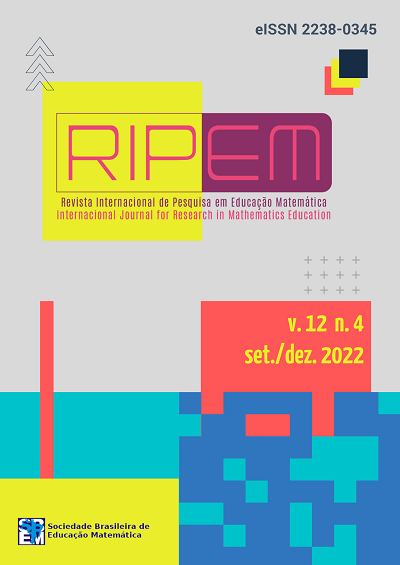Computational Literacy & Mathematics Education
DOI:
https://doi.org/10.37001/ripem.v12i4.3144Palavras-chave:
Mathematics Education, Mathematics, Computational Literacy, Computer ProgrammingResumo
Computer programming has permeated many fields as a tool to model phenomena and processes and to make new discoveries. Curricula in many jurisdictions have been revised to use computer languages across K-12, and in some cases in mathematics education. The literature suggests that while digital media in mathematics education can be used as tools that serve our purposes, they also serve to reorganize knowledge. This paper investigates the interactions among computer programming and mathematics teaching and learning. Our data sources are a) Ontario curriculum documents, b) resources developed by our team in Ontario and in Brazil, and c) our research in Ontario and Brazil. diSessa’s idea of computational literacy serves as a theoretical framework and as an analytical lens for conceptualizing how the integration of computer programming may alter the structure and experience of school mathematics.
Downloads
Referências
Barba, L.A. (2014). Computational thinking is computational learning. Keynote address at SciPy (Scientific Computing with Python) Conference, Austin, Texas. Video retrieved 5/01/17: http://lorenabarba.com/gallery/prof-barba-gave-keynote-at-scipy-2014.
Barba, L. (2016). Computational thinking: I do not think it means what you think it means. Lorena A. Barba Group. http://lorenabarba.com/blog/computational-thinking-i-do-not-think-it-means-what-you-think-it-means.
Berg, B. L. (2007). Qualitative research methods for the social sciences. New York, NY: Pearson Publishers.
Bogost, I. (2005). Procedural Literacy: Problem Solving with Programming, Systems and Play. Telemedium: The Journal of Media Literacy, 52 (1 & 2), 32-36.
Borba, M. C., & Villarreal, M. E. (2005) Humans-with-media and reorganization of mathematical thinking: Information and communication technologies, modeling, experimentation and visualization. New York, NY: Springer.
Clements, E. (2020). Investigating an Approach to Integrating Computational Thinking into an Undergraduate Calculus Course. Western University Electronic Thesis Repository.
Cowley, S.J. & Kuhle, A. (2020). The rise of languaging. Biosystems, 198, 1-12.
Creswell, J. W. (2002). Educational Research: Planning, Conducting, and Evaluating Quantitative and Qualitative Research. London: Pearson Education.
Diamond, J. 1999. Guns, Germs, and Steel. New York: W.W. Norton and Co.
diSessa, A. A. (2000). Changing minds: Computers, learning, and literacy. Cambridge, MA: MIT Press.
diSessa, A. A. (2018). Computational Literacy and “The Big Picture†Concerning Computers in Mathematics Education. Mathematical Thinking and Learning, 20(1), 3-31.
Doyle, W. (1992). Curriculum and pedagogy. In P. W. Jackson (Ed.), Handbook of research on curriculum (pp. 486-516). Macmillan.
Gadanidis, G. (2021). Math + coding teams. Whitby, ON: LearnX Publications.
Gadanidis, G, Clements, E. & Yiu, C. (2018). Group theory, computational thinking and young mathematicians. Mathematical Thinking and Learning 20(1), 32-53.
Gadanidis, G. & Cummings, J. (2018). Integrated mathematics + computer studies Grade 10 (White Paper). Toronto, ON: Ontario Mathematics Knowledge Network, Fields Institute for Research in Mathematical Sciences.
Guzdial, M. (2019). Computing Education as a Foundation for 21st Century literacy. In Proceedings of the 50th ACM Technical Symposium on Computer Science Education (SIGCSE '19) (pp. 502-503.). New York, NY: ACM.
Hoyles, C., & Noss, R. (1987). Children working in a structured Logo environment: From doing to understanding. Récherches En Didactiques De Mathématiques, 8 (12), 319–352.
Jenkins, H. (2006). Confronting the Challenges of Participatory Culture: Media Education for the 21st Century, Chicago: The MacArthur Foundation.
Kafai, Y. B., Proctor, C., & Lui, D. A. (2019). Framing Computational Thinking for Computational Literacies in K-12 Education. In Proceedings of the Weizenbaum Conference 2019 "Challenges of Digital Inequality - Digital Education, Digital Work, Digital Life" (pp. 1-6). Berlin.
Levy, P. (1997). Collective intelligence: Mankind's emerging world in cyberspace. New York: Basic Books.
Luszkiewicz, J. & Warfel, J. (2019). The mathematical assumptions within computational literacy. In J. Jones & Hirsu, L. (Eds.) Rhetorical Machines: Writing, Code, and Computational Ethics (pp 93-109), University of Alabama Press.
Merriam, S.B. (1998) Qualitative Research and Case Study: Applications in Education. Jossey-Bass Publishers, San Francisco.
Noss, R., & Hoyles, C. (1988). The computer as mediating influence in the development of pupils’ understanding of variable. European Journal of Psychology of Education, 3 (3), 271–286.
Noss, R., & Hoyles, C. (1992). Looking back and looking forward. In C. Hoyles, & R. Noss (Eds.), Learning mathematics and Logo (pp. 431–468). Cambridge, MA: The MIT Press.
O'Connell, D. C. (1988). Critical essays on language use and psychology. New York: Springer-Verlag.
Ontario Ministry of Education (2020). The Ontario Mathematics Curriculum, Grades 1 to 8. Toronto, ON: Queen’s Printer Press.
Ontario Ministry of Education (2021). The Ontario Mathematics Curriculum, Grade 9: Overall and specific expectations. Toronto, ON: Queen’s Printer Press.
Papert, S. (1980). Mindstorms: Children, computers, and powerful ideas. New York, NY: Basic Books.
Rodd, M. (2003). Witness as participation: the lecture theatre as site for mathematical awe and wonder. For the Learning of Mathematics, 23(1), 15-21.
Swain, M., Lapkin, S., Knouzi, I., Suzuki, W. and Brooks, M. (2007). Languaging: university students learn the grammatical concept of voice in French. The Modern Language Journal 93(1), 5-29.
Vakil, S. (2018). Equity in computer science education. Harvard Educational Review, 88(1), 26-53.
Vygotsky, L.S. (1978). In: Cole, M., John-Steiner, V., Scribner, S., Souberman, E. (Eds.), Mind in Society: the Development of Higher Psychological Processes. Harvard University Press, Cambridge, MA.
Vygotsky, L. S. (1987). Thought and word In R. W. Rieber & A. S. Carton (Eds.), The collected works of L. S. Vygotsky (Vol. 1) (pp. 243-285). New York: Plenum.
Wing, J. M. (2006). Computational thinking. Communications of the ACM, 49 (3), 33–35.
Wing, J. M. (2008). Computational thinking and thinking about computing. Philosophical Transactions of the Royal Society A, 366 (1881), 3717–3725.
Yin. R.K. (2014). Case Study Research Design and Methods (5th ed.). Thousand Oaks, CA: Sage. 282 pages.
Zwicky, J. (2003). Wisdom & Metaphor. Kentville, NS: Gaspereau Press.
Publicado
Como Citar
Edição
Seção

Este trabalho está licensiado sob uma licença Creative Commons Attribution-NonCommercial-ShareAlike 4.0 International License.








